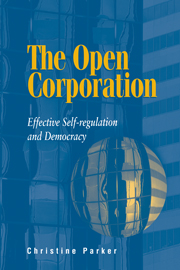Book contents
- Frontmatter
- Contents
- List of tables and figures
- Preface
- Acknowledgements
- 1 Introduction: Corporate self-regulation in the new regulatory State
- 2 The potential for self-regulation
- 3 Motivating top-management commitment to self-regulation
- 4 Cultivating self-regulation leadership
- 5 Self-regulation methodology and social harmony
- 6 The pathologies of self-regulation
- 7 Model corporate Citizens: The role of self-regulation Professionals
- 8 The three strategies of ‘permeability’ in the open Corporation
- 9 Meta-regulation: The regulation of self-regulation
- 10 Conclusion
- Appendix: Methodology
- Notes
- Reference
- Index
4 - Cultivating self-regulation leadership
Published online by Cambridge University Press: 05 July 2014
- Frontmatter
- Contents
- List of tables and figures
- Preface
- Acknowledgements
- 1 Introduction: Corporate self-regulation in the new regulatory State
- 2 The potential for self-regulation
- 3 Motivating top-management commitment to self-regulation
- 4 Cultivating self-regulation leadership
- 5 Self-regulation methodology and social harmony
- 6 The pathologies of self-regulation
- 7 Model corporate Citizens: The role of self-regulation Professionals
- 8 The three strategies of ‘permeability’ in the open Corporation
- 9 Meta-regulation: The regulation of self-regulation
- 10 Conclusion
- Appendix: Methodology
- Notes
- Reference
- Index
Summary
Management motivations for commitment to institutionalizing social and legal responsibility are complex. Some companies are spurred to leadership by multiple motivations for self-regulation, while others will follow only when compliance Systems have become a ‘taken for granted’ part of doing business. The objection to good corporate citizenship that management would not, or perhaps should not, dilute economically rational decision-making with social and legal responsibility issues is therefore too simplistic. In fact, management often will voluntarily take such factors into account either because they think it is Strategie to do so, or because it has become unthinkable to do anything else.
The first section of this chapter broadens out the analysis in the previous chapter using my general interviews with self-regulation professionals. Compliance managers are very clear that organizational commitment depends primarily on the commitment of the very top level of management (the CEO and sometimes the board). Compliance managers' analyses of top-management thinking reveal that the most robust commitment to the self-regulation System is motivated by Strategie decisions to eultivate an identity of leadership. However, this motivation to become a self-regulation leader is rarely, if ever, spontaneous. It is most commonly prompted by the experience of a regulatory disaster or public relations crisis either within the Company or close to it (a parent, associated Company or close competitor). Firms that take the lead create modeis of self-regulation System implementation and excellence, sometimes in partnership with regulators or even public interest groups.
- Type
- Chapter
- Information
- The Open CorporationEffective Self-regulation and Democracy, pp. 84 - 111Publisher: Cambridge University PressPrint publication year: 2002



